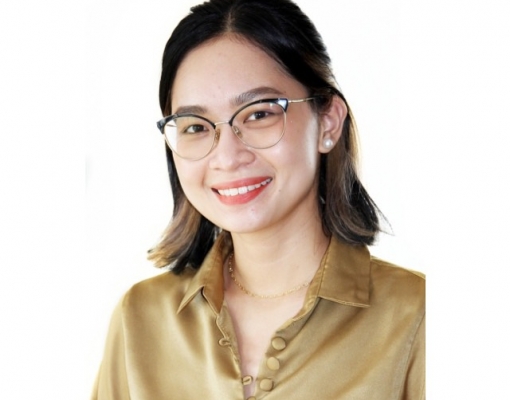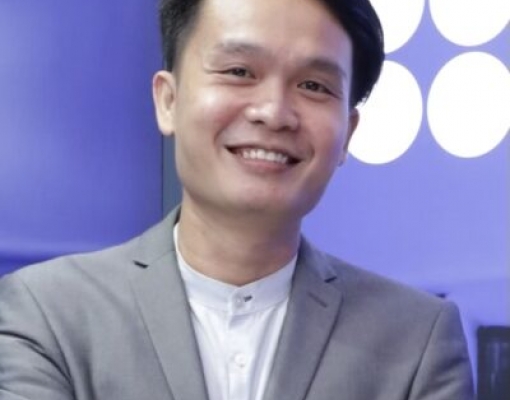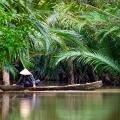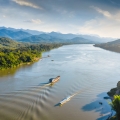Stories in the making: Updates from the 2025 media-research collaboration fellowships
Across the Mekong Region, climate change, water governance, and energy transitions are shaping the lives of millions. To tell these complex stories in ways that resonate with local communities and inform public dialogue, SEI’s Mekong Thought Leadership and Think Tanks Network Program (MTT) is supporting a cohort of journalists and communicators working in close collaboration with researchers.
Several months into the fellowship, media fellows and their research partners are turning science and fieldwork into engaging storytelling, from documentary films and feature articles to hands-on media training sessions.
Vietnam: Bridging research and community voices
In the Mekong Delta, Nguyen Tuan An Pham and Nguyen Thi Anh Thu are collaborating with the project “Building resilience and adaptive capacity of Women’s Union to address water-energy-climate challenges.” After two field visits and a series of in-depth interviews, they are now writing an in-depth article using a GEDSI lens and the solutions journalism approach.
In April, the duo led a two-part online training titled “Media Sharing Workshop under the SEI Media Fellowship” to strengthen the media capacities of their research partners.
The sessions introduced researchers to key communication tools: press release writing, easy-to-use infographic tools, video production with mobile phones, and basic photography. This joint workshop with another fellow, Quach Thi Kieu Mai, brought together 20 participants, many of whom were young researchers-cum-communicators.
“We were grateful for the active participation of both young communicators and researchers,” wrote Anh Thu in an email to us. “It shows there’s a real appetite to collaborate and tell these stories better.”
Hydropower and equity for ethnic minority communities
In north-central Vietnam, Kieu Mai has been exploring the project “Promote equitable sharing of water resources for ethnic minority communities living downstream of small hydropower projects through collaboration among the community, businesses, and the state” in Nghe An Province.
She recently published an article in Vietnamese, titled “Chia sẻ nước công bằng: Khoảng tối sau ánh sáng từ thủy điện nhỏ” (translation: Equitable water sharing: The darkness behind the light of small hydropowers). A second, more comprehensive English-language piece is in the works.
In addition to reporting, Mai has hosted two media training workshops - one for her paired research team and another in collaboration with Duc An’s team. Her session focused on how to write press releases from research findings and how to use accessible language for general readers, receiving the participation of the entire research team in Nghe An.
Thailand: Documenting the Songkhram river on film
Meanwhile in northeast Thailand, Theerayut Weerakham has just completed a short documentary highlighting the ecological importance of the Songkham River wetlands, local knowledge and transboundary water governance. His work is part of a partnership with the project “Solutions and Opportunities in managing water Storage to reduce transboundary water-related disaster risks and to address multiple water demands”.
The film is now being prepared for release. Theerayut also hopes to screen the film at the upcoming Mekong-ASEAN Environmental Week in Nakhon Phanom, expected this September.
A media training workshop, tentatively on interview techniques and video editing, is also being planned with his partnering research team.
Cambodia: Telling stories from the margins
One of our youngest fellows in this cohort, Eung Sea, is working with two MTT projects, both based in often-overlooked areas of Cambodia. The first project is “Addressing water scarcity through groundwater use: development of solar-powered groundwater treatment system for remote area of Cambodia”. Another is “Assessing the communities' resilience to climate change: Water-Energy-Climate Nexus: a case study in Mekong sub-region's marginalized communities in Stung Treng province”.
His stories, written in English, are scheduled to be published in CamboJA News in June. He is also planning a media workshop with My Village Organization, where he will walk researchers through the basics of journalism: from finding a compelling angle to writing for public audiences.
Laos: Supporting resilient agriculture and fisheries
In Laos, two fellows are advancing media collaborations in different regions of the country.
Keoxomphou Sakdavong has been working with researchers of the project “Strengthening climate resilience of agricultural livelihoods in Savannakhet Province, Lao PDR through participatory Ecosystem-based Adaptation”. A feature article highlighting the project was recently published in the Vientiane Times.

The article "Savannakhet strengthens agricultural resilience through climate adaptation research" by Keoxomphou Sakdavong.
Meanwhile, Patithin Phetmeuangphuan is focused on fisheries resilience in Luang Prabang. Two English-language stories for the Vientiane Times are currently in draft, featuring the MTT-funded project “Enhancing Fisheries Resilience and Managing Fisheries Resources Sustainably under Climate Change Impacts through Local Community Participation in Lao PDR”.
Keo and Patithin are also working together to plan a training session with the research partner in Savannakhet, where they will share writing, photography, and video skills with a wider audience of university members.
Looking ahead
As the fellowships are concluding in June, we look forward to sharing more impactful stories in the coming weeks on the SUMERNET website and social media. Beyond reporting, this initiative is building long-term bridges between researchers and media professionals, as well as fostering collaboration among journalists and filmmakers from different parts of the Mekong Region.
More details about each research project can be found here.
Info
This story is part of the following project
Mekong Thought Leadership and Think Tanks Network
Topic
Country
Related people
You might be interested in
-
Grants open for research linking to policy action under Mekong Thought Leadership and Think Tanks Network Program
Mekong Thought Leadership and Think Tanks (MTT) Network Program calls for applications to its research-to-policy grants supporting evidence-based research that connects to practical solutions to challenges in the water-energy-climate nexus.
![Grants open for research linking to policy action under Mekong Thought Leadership and Think Tanks Network Program]()
-
Now open: fellowship opportunities under Mekong Thought Leadership and Think Tanks Program
MTT Program is opening a call for fellowships to be hosted in Cambodia, Lao PDR, Thailand, and Vietnam. The Program will award up to 13 high-quality entry- or mid-level professionals of all genders who are Mekong citizens.
![Now open: fellowship opportunities under Mekong Thought Leadership and Think Tanks Program]()
-
Call for 3rd batch applications: fellowship opportunities under Mekong Thought Leadership and Think Tanks Program
MTT Program is opening a call for fellowships to be hosted in Cambodia, Lao PDR, Thailand, and Vietnam. The Program will award up to 13 high-quality entry- or mid-level professionals of all genders who are Mekong citizens.
![Call for 3rd batch applications: fellowship opportunities under Mekong Thought Leadership and Think Tanks Program]()
 By
By 








 Read more about SUMERNET
Read more about SUMERNET
